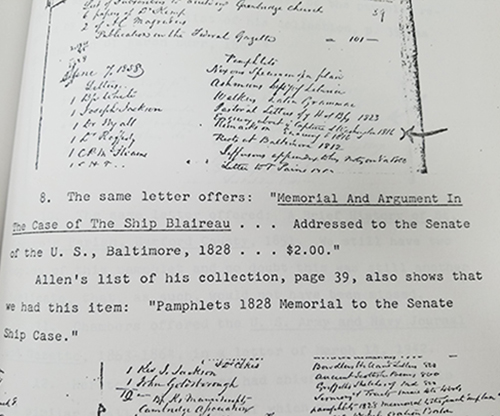By Mary Klein, diocesan archivist
 In some circles, John Brown’s raid on a federal arsenal in Harper’s Ferry, Virginia, on October 16-18, 1859, made him into a martyr. But contemporary abolitionists like William Lloyd Garrison called his revolutionary plan “misguided, wild and apparently insane.” Brown had tried to attract Frederick Douglas to join his plot as a liaison with slaves, and to then become the President of a “Provisional Government” but Douglas declined, saying, “An attack on the federal government would array the whole country against us. You will never get out alive.” Brown believed that slaves would flock to his side in open revolt, and he would sweep down the Appalachia Mountains, gathering supporters as he went. He said, “When I strike, the bees will swarm.”
In some circles, John Brown’s raid on a federal arsenal in Harper’s Ferry, Virginia, on October 16-18, 1859, made him into a martyr. But contemporary abolitionists like William Lloyd Garrison called his revolutionary plan “misguided, wild and apparently insane.” Brown had tried to attract Frederick Douglas to join his plot as a liaison with slaves, and to then become the President of a “Provisional Government” but Douglas declined, saying, “An attack on the federal government would array the whole country against us. You will never get out alive.” Brown believed that slaves would flock to his side in open revolt, and he would sweep down the Appalachia Mountains, gathering supporters as he went. He said, “When I strike, the bees will swarm.”
 While the shocking events in Harper’s Ferry were going on, the General Convention was meeting in Richmond, Virginia, and Bishop William Whittingham wrote daily to his wife. He detailed the dramas taking place in the House of Bishops, and on October 19, wrote, “The Virginia War is probably better known to you than to us. The excitement here is fast subsiding. It has served to show me how very rotten, even here, is the ground on which public security rests. From the greatest to the least, all felt thoroughly uneasy lest the ramifications of the contemptable plot which has fizzled out a hundred miles off, should have spread beneath the surface of society at this distance, and be threatening domestic treason and general insurrection under the seeming quiet of the undisturbed face of things. It will make all the South more bitter than ever against the North.”
While the shocking events in Harper’s Ferry were going on, the General Convention was meeting in Richmond, Virginia, and Bishop William Whittingham wrote daily to his wife. He detailed the dramas taking place in the House of Bishops, and on October 19, wrote, “The Virginia War is probably better known to you than to us. The excitement here is fast subsiding. It has served to show me how very rotten, even here, is the ground on which public security rests. From the greatest to the least, all felt thoroughly uneasy lest the ramifications of the contemptable plot which has fizzled out a hundred miles off, should have spread beneath the surface of society at this distance, and be threatening domestic treason and general insurrection under the seeming quiet of the undisturbed face of things. It will make all the South more bitter than ever against the North.”
 The next day he wrote, “The insurrection is again exciting more attention. A young officer just returned showed me this morning a specimen of the pike. (He said 9,000 from the horse wagon loads; but two papers say more probably) 1,500 were found stored away together with many more of Sharp’s rifles. The pike was a really formidable weapon, and the worst of it is, it must have been made in the North to be used by Negroes here, when raised.”
The next day he wrote, “The insurrection is again exciting more attention. A young officer just returned showed me this morning a specimen of the pike. (He said 9,000 from the horse wagon loads; but two papers say more probably) 1,500 were found stored away together with many more of Sharp’s rifles. The pike was a really formidable weapon, and the worst of it is, it must have been made in the North to be used by Negroes here, when raised.”
 By his letter of October 22, the events at Harper’s Ferry were not even mentioned, merely the day-to-day debates and actions of General Convention. But John Brown’s raid on a federal arsenal changed the course of American history. Before the raid, leading politicians wanted to believe that somehow the divisions between North and South would eventually lead to compromise, but John Brown’s actions terrified Southerners with thoughts of open slave rebellion and radicalizing many Northerners. Bishop Whittingham’s words that Brown’s actions would “make all the South more bitter than ever against the North” were prophetic indeed.
By his letter of October 22, the events at Harper’s Ferry were not even mentioned, merely the day-to-day debates and actions of General Convention. But John Brown’s raid on a federal arsenal changed the course of American history. Before the raid, leading politicians wanted to believe that somehow the divisions between North and South would eventually lead to compromise, but John Brown’s actions terrified Southerners with thoughts of open slave rebellion and radicalizing many Northerners. Bishop Whittingham’s words that Brown’s actions would “make all the South more bitter than ever against the North” were prophetic indeed.








